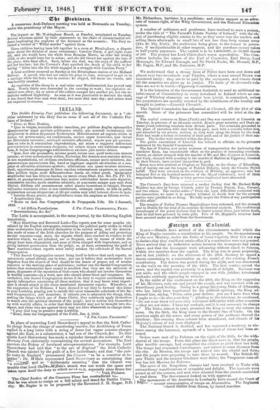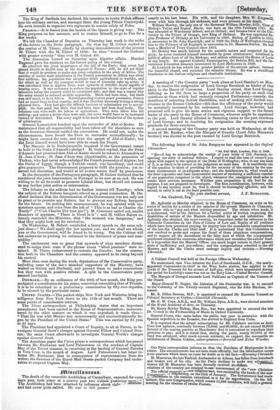Joreign anb Qtotonfat.
ITALY.—Details have arrived of the circumstances under whioh the King of Naples concedes a constitution to his people. On the appointment of the new Ministry, under the Duke of Serra Capriole, their first act was to declare that they could not retain office if a constitution were not granted. News arrived that an indecisive action between the insurgents had taken place; and that the insurgents wore advancing without check to Salerno, within two marches from the capital. The King was in great perplexity, and at last yielded: on the afternoon of the 28th January he signed a decree consenting to a constitution on the model of the existing French constitution. The decree was posted during the night, and was discovered on the walls on the morning of the 29th. The first readers spread the news, and the capital was presently in a tumult of delight. Business was put aside, and the whole people engaged in one wide jubilee; tricoloured cockades suddenly appearing in swarms. In the midst of the excitement on the 29th, the King, on time suggestion Of his Ministers, rode out and joined the people, and was received with ex- traordinary good feeling. Seeing in a group the young Duke of Albanetto, who has lately been imprisoned for his political opinions, the King ad- dressed him, saying, " Proto, calm your desires: you see I have done what I ought to do—do also your duty ": alluding to the tricolour, he continued, "Do not wear these colours; they will cause difficulties with other countries —they are not mine: I have my cockade, and it is not necessary to change it." The Duke, almost in tears, promised the King to wear the colours no more. On the 30th, the King went to the theatre San of Carlo. On the previous night all the actors and every person of the audience showed the tricolour : this evening these colours were abandoned, and ribands of his Majesty's colour of red were displayed. The National Guard is doubled, and has repressed a tendency to vio- lence among the lazzaroni, upwards of a hundred of whom had been ar- rested. Orders were sent off to Palermo on the night of the 29th, for the with- drawal of the troops. From this place the latest news is, that the people, after terrible carnage, had compelled the eoldiers to yield their lent hold. The troops had evacuated Castellamare, and retired to some distance from the city. At Messina, the troops had retired into the citadel and forts; and the people were preparing to take these by assault. The British fri- gate Thetis and the steamer Gladiator were there; the Vengeance man-of- war has left Messina for Palermo. The news of the Neapolitan changes had been received in Turin with extraordinary manifestations of sympathy and delight. The journals Were posted at all the corners, and men were selected from the crowds assembled to read them. The Government looked on with approval. The movements of the Austrians in Lombardy have roused the Court dt ^ nrompt concentration of troops on Alessandria. The Regiment sedered thither from Genoa, by forced marches.
The King of Sardinia has declared his intention to invite Polish officers into his military service, and amongst them the young Prince Czartoryski. He even intends to organize two regiments to consist solely of Poles.
Faanca.—It is feared that the health of the Queen is giving way. The Irmg purposes on her account, and to restore himself, to go to Pau for a few weeks.
We left the Chamber of Deputies on Thursday last week in the midst of the debate on the Swiss paragraph. On that day M. Guizot replied to the oration of M. Thiers; chiefly by showing inconsistencies of the present M. Thiers with the M. Thiers of 1836: he then "treated the Radicals with greater severity" than ever M. Guizot did.
The discussion turned on Saturday upon Algerine affairs. Marshal Bugeaud gave his opinions on the future policy of the colony.
He admitted the great importance of the fall of the Emir; that event had placed 30,000 or 40,000 men at the disposal of France: still, he did not think that it would be prudent to make any great reduction in the army of Africa. The number of native male inhabitants in the French possessions in Africa was about four millions; the population was altogether either agricultural or warlike, and the oldest as well as the youngest would in case of necessity take up arms; it was calculated that in Algeria there were upwards of 500,000 Arabs capable of bearing arms. It was necessary to reduce the population to the state of regular labourers before the country could be considered safe; and that was a reason why the army should be reduced as little as possible. Much had been done, but there was still much to do in Africa. Notwithstanding sixteen years' possession, France had no moral force in that country, and it was therefore necessary to keep a strong physical force. They had also the difficult business of colonization yet to accom- plish. On that point the little that had been done had been done badly. The Monists sent were unfit for labour or agriculture. They were idlers who did nothing; and unless a better class were sent, the army would have to be increased instead of diminished. The army ought to be made the foundation of the system of colonization.
General Lamoriciere touched upon the surrender of Abd-el-Kader. He Maintained that all responsibility had been taken off his shoulders as soon u the Governor-General ratified the convention. He could not, under the circumstances, have forced the Emir to surrender unconditionally: he might have secured the tent, and even the carpet of Abd-el-Kader; but the Emir himself would have been able to reach the Desert.
The Marquis de la Rochejacquelin inquired if the Government meant to hold to the Duke d'Aumale's pledge? M. Guizot replied, that the Duke d'Aumale had promised that Abd-el-Kader should be taken to Alexandria or St. Jean d'Acre: St. Jean d'Acre was objectionable, as the possession of Turkey, who had never acknowledged the French possession of Algiers; but the Pacha of Egypt, though a Turkish vassal, was hereditary, and could give guarantees. The Government proposed to fulfil the promise; yet re- served full discretion, and would at all events secure itself by guarantees.
In the discussion of the Portuguese paragraph, M. Guizot declared that he considered the joint intervention in Portugal to be now at an end. He was willing to do all he could to promote Liberal ideas, but should not consent to any further joint action or intervention.
The -debates on the address had no farther interest till Tuesday; when the subject of the Reform banquets stirred up a great commotion. M. Du- elated declared that the determination of the Government was not only not to grant or to promise any Reform, but to prevent any Reform banquets for the future. On making this announcement, he was saluted with tre- mendous uproar, and cries from the left of "This is as bad as Charles the Tenth!" (" C'est Charles Dix tout purl") M. Cremieux called out, amidst thunders of applause' "Them is blood in it "; and M. Odilon Barrot so- lemnly reminded the Ministers, that "the moment was dangerous," and
7
that they might look out for revolution.
On Wednesday, M. Hebert concluded a heavy speech on the same sub- ject thus—" We shall apply the law against you, and we shall see which, you or the Government, will be found to be wrong. But the Cabinet will not endeavour to prolong its existence to the detriment of peace and tran- quillity." The excitement was so great that upwards of sixty members threat- e ned to resign their seats if the phrase about "blind passions" were re- tained. M. Thiers endeavoured to restrain the Gauche; but the commo- tion both in the Chambers and the country appeared to be rising beyond his control. More than once during the week, deputations of the Conservative party, including some of the most attached supporters of the Ministry, have waited on Guizot and Duchatel, and pressed them to make concessions; but they met with positive refusal. A split in the Conservative party seemed inevitable.
DENMARK.—By an ordinance of the 20th of last month, the King pro- mulgated a constitution for his states, somewhat resembling that of Prussia: it is to be submitted to a preliminary examination by fifty-two deputies, to be elected by the provincial states. UNITED STATEs.—The packet-ships New York and Waterloo bring in- telligence from New York down to the 17th of last month. There are some points of considerable interest. The Times correspondent at Philadelphia states that an important amendment had been carried in the House of Representatives: unencum- bered by the other matters on which it was engrafted, it reads thus- " That the war with Mexico was unnecessarily and unconstitutionally be- gan by the President of the United States." This was carried by 85 yeas to 81 nays.
The President had appointed a Court of Inquiry, to sit at Perot% to in- vestigate General Scott's charges against General Pillow and Colonel Dun- can; the same Court afterwards to investigate General Worth's charges against General Scott.
The American paper the Union prints a correspondence which has passed between Mr. Buchanan and Lord Palmerston on the conduct of Captain May of the Teviot steamer, in conniving at the landing of General Paredes at Vera Cruz, in the month of August. Lord Palmerston's last letter in- forms Mr. Buchanan, that in consequence of representations from the writer, the directors of the Royal Mail Steam-packet Company had under- taken to suspend Captain May.



























 Previous page
Previous page